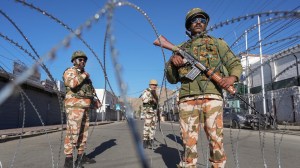Japan wants India to sign CTBT for ease of sanctions
NEW DELHI, FEB 22: Japan wants India to make "specific gestures" including early signing of the Comprehensive Test Ban Treaty to...

NEW DELHI, FEB 22: Japan wants India to make "specific gestures" including early signing of the Comprehensive Test Ban Treaty to pave the way for easing of sanctions imposed after the Pokhran nuclear tests in May, 1998, former Japanese prime minister Ryutaro Hashimoto indicated on Tuesday.
Asked specifically what Tokyo was hinting at, Hashimoto, senior foreign policy adviser to the Japanese Premier Keizo Obuchi, told reporters here "the cards are in India’s hands." Hashimoto, who has met senior ministers, opposition leaders and others during his visit here, revealed that a Japanese appraisal team from the Overseas Economic Cooperation Fund (OECF) was here last month for parleys on the second phase of the Rs 4,860 crore Delhi metro rail project.
The team’s visit is being viewed as a clear signal of Japan’s desire to resume its assistance for developmental projects in India. Tokyo has released the first tranche of 14,760 million Yen which is drawn upon for the project since 1998-99. Japan has agreed to extend soft loan to the extent of 56 per cent of the project cost. Hashimoto, who was prime minister at the time of the nuclear explosions, had taken a hard stance and suspended official development assistance (ODA) to India and Pakistan besides supporting other western punitive measures.
Hashimoto said Japan looked forward to India’s early signing of the CTBT. "If India is to take this symbolic decision, it will be able to join the international stream for non-proliferation….Which would be mutually beneficial for India and also help in further strengthening bilateral relations with Japan," he said. The Japanese leader, however, hastened to add that "this (signing CTBT) is a decision India will have to take by themselves and for themselves."
The former Japanese premier regretted that the nuclear tests had taken place at a time when "utmost efforts" were being made by both countries to consolidate bilateral ties. He said ODA was frozen in accordance with its charter evolved much before the nuclear tests. After the tests, Japan had little choice but to implement the charter, he indicated. Hashimoto also stated that Japan fervently desired that bilateral relations with India should not be stalled on a single issue.
He felt that exchange of high-level visits by the two countries and joint commemorative activities to mark the 50th anniversary of establishing diplomatic ties between the two countries would help give a new dimension to bilateral relations. Asked whether Japan shared US apprehensions of a "dangerous situation" prevailing between India and Pakistan, he said Tokyo desired a peaceful solution to the Jammu and Kashmir issue.
Hashimoto said the Kargil conflict had increased concerns in the international community that the India-Pakistan problem could lead to some danger. Japan, he said, had offered its condolences to the many casualties in the Kargil operations and paid tributes to Indian soldiers who had fought under trying conditions. If India’s borders were affected in any manner, it would have a fallout on South Asia and the entire world. So any condition of instability in these areas was a matter of concern for the international community, he added.







- 01
- 02
- 03
- 04
- 05
























